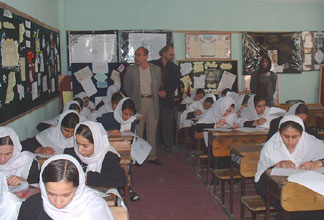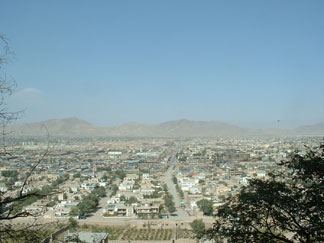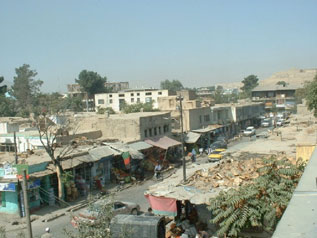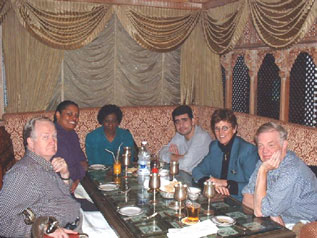 |
Here, Muslum women are studying finance. John Deupree, back right, is conducting a feasibility study to open an American University in Kabul. His sister, Jean Deupree, Ph.D., works in UNMC’s department of pharmacology. |
In February, Sheila Ryan, Ph.D., College of Nursing professor, and Rosaline Olade, Ph.D., College of Nursing associate professor, traveled to Kabul, Afghanistan, with Ward Chambers, M.D., associate professor of cardiology and executive director of community and multicultural affairs; and Valda Ford, director of community and multicultural affairs, to meet with nursing officials of Aga Khan University.
Aga Khan University wants to improve the quality of nursing by raising the level of nursing curriculum in Afghanistan, including the introduction of baccalaureate level classes for nurses and for allied health. Currently, nursing students in Afghanistan complete coursework to obtain a diploma in nursing at one of nine District Schools of Nursing. Baccalaureate, masters and doctorate degrees aren’t offered.
 |
Kabul is a city of 3 million people situated in a bowl. It is bordered by foothills that precede the Himalayas and Hindu Kush mountains. Open shops in Kabul provide materials and products not available during the Taliban days. Shop fronts are made by adapting air cargo boxes discarded from transports during the war. |
 |
UNMC is a natural choice as a partner for Aga Khan University to achieve this goal, Dr. Ryan said. Aga Khan University has provided medical services to the Afghan people since the end of the war in 2001, committing a total of $75 million to providing health care. UNMC’s expertise in innovative distance education provides a perfect complement to Aga Khan’s passion for improving nursing education, Dr. Ryan said.
“UNMC already offers an online master’s in nursing program and more than 75 nursing courses are available online as part of UNMC’s commitment to helping reach out to rural nurses in western Nebraska,” Dr. Ryan said. “These courses could easily be utilized by Aga Khan University to raise the caliber of nursing education in Afghanistan to match current standards of practice. UNMC stands ready to pursue funding for these initiatives when Aga Khan University and the District Institutes for Health Sciences are ready to move forward.”
 |
UNMC’s Valda Ford, second from left, Rosaline Olade, third from left, Sheila Ryan, second from right, and Ward Chambers, right, enjoy a meal with other American travelers. |
Aga Khan University also wants to develop an Allied Health curriculum, a need UNMC likely will respond to. Allied health professionals in Afghanistan currently learn on-the-job. No formal curriculum or training exists. According to Dr. Ryan, adding the allied health curriculum is a critical piece in rebuilding the country’s health care system.
Finally, Aga Khan wants to build faculty capacity and provide continuing education to the clinical nurse leaders providing nursing care. A proposal developed by UNMC, the University of Kentucky, and Marquette University schools of nursing to USAID to offer online continuing education in leadership/management, infectious diseases, and maternal/child health in the Central Asian Republics offers one model that matches Aga Khan’s identified continuing education needs, Dr. Ryan said.
“The online model is perfect for what Aga Khan University wants to accomplish,” Dr. Ryan said, “and it is another way for UNMC to demonstrate world-class leadership in health professions education globally.”